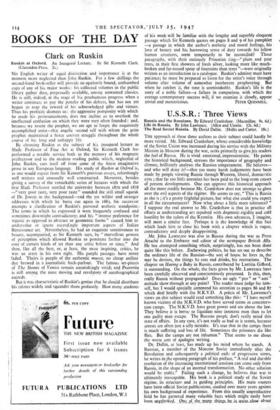U.S.S.R.: Three Views
The Real Soviet Russia. By David Dallin. (Hollis and Carter. 18s.) THE approach of these three authors to their subject could hardly be more varied. Mr. Edward Crankshaw, whose considerable knowledge of the Soviet Union was increased during his service with the Military Mission in Moscow during the war, seeks primarily to give ,his readers, the feel of Russia. He is vivid, emotional, impressionistic. He paints the historical background, stresses the importance of geography and climate, brilliantly analyses the Russian temperament. He believes— and who will deny it?—that too many harsh judgements -have been made by people viewing Russia through Western, liberal, 'democratic eyes ; that far too little attention has been paid to the long-term causes of present developments. One can approve this historical approach all the more readily because Mr. Crankshaw does not attempt to gloss over the evil aspects of the regime: He seems to say, " This is Russia as she is ; it's a pretty frightful picture, but what else could you expect in all the circumstances? Now what about a little more tolerance? " I suppose the real answer to Mr. Crankshaw is that in practice all efforts at understanding are repulsed with dogmatic.rigidity and cold hostility by the rulers of the Kremlin. His own advances, I imagine, will meet a similar fate. Perhaps it is the knowledge of this fact which leads him to close his book with. a chapter which is vague, contradictory and deeply disappointing.
Mr. John Lawreace was also in Russia during the war as Press Attache to the Embassy and editor of the newspaper British Ally. He has attempted something which, surprisingly, has not been done quite like this before. .Eschewing politics, he has set out to describe the ordinary life of the Russian—the sort of house he lives in, the way he dresses, the things he eats and drinks, his recreations. The chapter on Having a Baby in Russia, contributed by Laetitia Gifford, is outstanding. On the whole, the facts given by Mr. Lawrence have been carefully observed and conscientiously presented. Is this, then, really Russia without propaganda? Does no ugly " pro " or " anti " attitude show through at any point? The reader must judge for him- self, but I would specially commend his attention to pages 86 and 87 which deal briefly with the N.K.V.D. A precis of Mr. Lawrence's views pn this subject would read something like this : " I have myself known victims of the N.K.V.D. who have served terms in concentra- tion camps. The N.K.V.D. have great power and are above the law. They believe it is better to liquidate nine innocent men than to let one guilty man escape. The Russian people don't really mind this state of affairs. In any case, it's not really as bad as it seems, because arrests are often just a silly mistake. It's true that in the camps there is much' suffering and loss of life. Sometimes the prisoners die like flies. But the camps are not inhuman." That seems to me about the worst sort of apologist writing.
Dr. Dallin, at least, has made up his mind where he stands. A Russian, a member of the Moscow Soviet immediately after the Revolution and subsequently a political exile of progressive views, he writes in the opening paragraph of his preface, " A real and durable resolution of the increasing international tensions can come only from Russia, in the shape of an internal transformation. No other solution would be stable." Failing such a change, he believes that war is ultimately inescapable. His book is a political study of the Soviet regime, its structure and its guiding principles. His main sources have been official Soviet publications, studied over many years against his own background of experience. From this usually unproductive field he has garnered many valuable facts which might easily have been landopiSects si...timMart.v_thinss..hc is, Quite_cleas -about
in his own mind is that there have been no substantial changes since the Revolution in the fundamental aims of Soviet Communism, and that, as far as the ultimate purpose of achieving world Communism is concerned, Stalin differs from Trotsky only in his assessment of the appropriate time to push ahead. Dr. Dallin, eager for the over- throw of the present regime, sees some hope for the future in the many millions of government employees who constitute the new intelligentsia in Russia. He depicts this class as restless and dis- contented, with no political conviction. in favour of the existing economic system and hostile to Communist expansionism abroad. Dr. Dallin sees this group as providing a possible spearhead for change. No doubt there are political undercurrents in Russia today the strength of which it is difficult to determine, but most recent visitors to Russia would consider Dr. Dallin guilty of some wishful



































 Previous page
Previous page